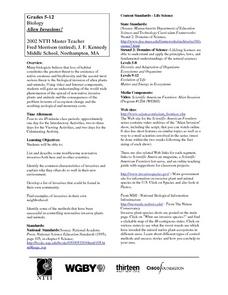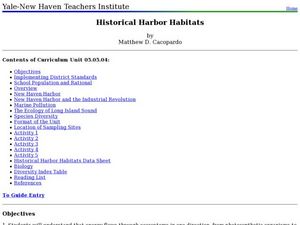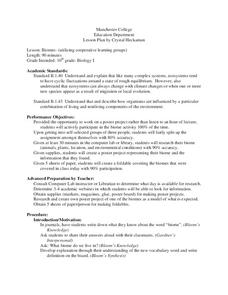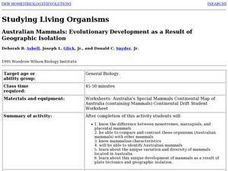Curated OER
Alien Invasions!
Students use video and Internet components, to gain an understanding of non-native invasive plants and animals and the ecological and monetary problems they cause.
Curated OER
Historical Harbor Habitats
Tenth graders create food web displays in the classroom. In this ecology lesson, 10th graders identify the different pollutants in the environment and their effect on organisms. They collect samples of sediments from the harbor and...
Curated OER
How do new species form?
Tenth graders conduct a critical analysis of current evolutionary concepts. They describe how scientists continue to investigate theories. Students examine examples with experimental data that suggest alternative methods of species...
Curated OER
Curious Crossbreeds
Students discover the diverse roles of hybridization among animals. They research certain examples of animal hybrids as a springboard to analyzing a zoo's potential exhibit of animal hybrids.
Curated OER
Vertebrate Dioramas
Students are able to describe the development of their chosen form of vertebrate life from the past to the present in a four to six page typed paper. They explain the use of phylogenetic tree. Students use the phylogenetic tree to...
Curated OER
Vertebrate Dioramas
Students describe the development of their chosen form of vertebrate life from the past to the present in a four to six page paper. They explain the use of a phylogenetic tree, and use this to exemplify an organism's evolutionary change...
Curated OER
Seasonal Cloud Cover Variations
Young scholars, in groups, access data from the NASA website Live Access Server regarding seasonal cloud coverage and the type of clouds that make up the coverage. They graph the data and make correlations between types, seasons and...
Curated OER
Carbon Monoxide and Population Density
Tenth graders investigate the carbon monoxide level at a fixed latitude to determine if there is a relationship to population density. They download data sets and generate a graph, and find locations using the Earth's coordinate system....
Curated OER
Examining the Stages of Ecological Succession
In this ecological succession worksheet, students answer questions about the process of succession in four ponds given diagrams and descriptions.
Curated OER
18th Century Microscope
Students examine a microscope from the 18th century. In this microscope lesson, students investigate how it works, what it was used for and how the tool has evolved through the years. Students also build knowledge on how compound...
Curated OER
Biomes
Tenth graders research locations of biomes and their barriers. In this biomes lesson, 10th graders examine location, environmental conditions, and species of plants and animals that live in the biome. Students take notes and create a...
Curated OER
The Challenge to Deliver Insulin
Students study the types of diabetes and why insulin is important. For this diabetes lesson students build molecular models and create a healthy lifestyle plan.
Curated OER
This Place is Going to the Dogs
Students study different breeds of dogs. They watch a video, "Extraordinary Dogs", about special dogs and how they are categorized according to their adaptations. Then they create a digital video that demonstrates the qualities of dogs...
Curated OER
What's Living in My Mouth?
Young scholars articulate in written and oral formats that bacteria can be found living everywhere. They explain in written and oral formats why the immune system is necessary. Students are presented with an opportunity to see bacteria...
Curated OER
The Birds and the Bees, and the Flowers and the Trees
Students examine the roles in which animals play in the pollination of plants. They recognize that flowers have male and female sexes. Students describe cross pollination and propose reasons for cross pollination through narration of a...
Curated OER
Extracting DNA
Students explore DNA, genes, chromosomes and the chemicals that make up DNA. They research Internet resources to develop their knowledge of DNA. They conduct an experiment to separate DNA from peas and create a poster that they can use...
Curated OER
Mountains in the Sea Exploration No Escape
High schoolers study data to hypothesis about the influence of a water circulation cell on the retention of benthic invertebrate larvae in the area of a seamount. They investigate the positives and negatives of larvae retention in this...
Curated OER
Peeled Trees Tell The Story
Students investigate the diversity of life that is found in Montana. They research some of the different interactions that organisms have with their environment. The lesson plan includes an extensive introduction for teacher information....
Curated OER
What's In A Name?
Young scholars create a binomial system of nomenclature for classifying organisms they encounter in a field trip to a natural history museum or from pictures in library books. They work in small groups to create accurate drawings and...
Curated OER
North Dakota Plants with Lewis and Clark
Tenth graders identify native plants of North Dakota. They compare the plants found on native prairie with the plants described in the Lewis and Clark journals. They present the information they have collected in an electronic format...
Curated OER
Dogs & Darwin
Ninth graders construct and conduct a laboratory experiment illustrating the transfer of mutations. They compare and contrast natural selection in organisms with long and short reproductive cycles.
Curated OER
Australian Mammals: Evolultionary Development as a Result of Geographic Isolation
Learners examine the differences between monotremes, marsupials, and placental mammals and are able to contrast these organisms with other mammals. They learn about unique variation and the diversity of mammals located in Australia.
Curated OER
Comparing Microscopic Organisms in Fresh and Polluted Water: An Invitation To Inquiry
Young scholars have the opportunity to develop and formulate ideas and explanations through the scientific standard of inquiry. They identify organisms by using an identification key for specific aquatic geographical area.
Curated OER
The Ultimate Predator
Students listen to a lecture by the teacher about the "Ultimate Predator." They design a new "Ultimate Predator." Students present their creations to the class and attempt to convince their classmates that their predator is indeed the...

























